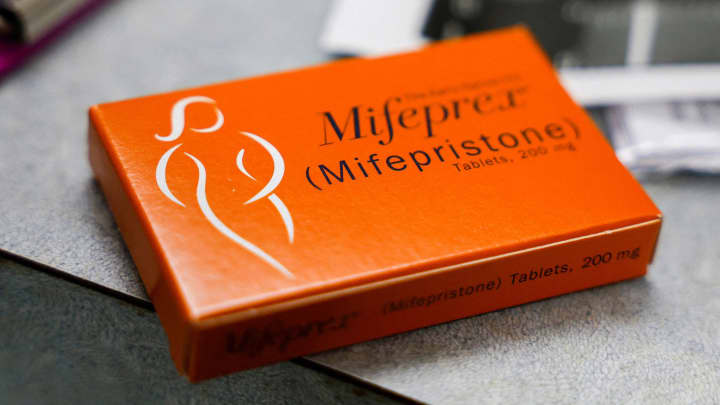
The Supreme Court on Wednesday took up a high-stakes legal battle that could lead to a definitive decision on whether the drug most commonly used for medication abortions will continue to be easily available, including by mail.
The court agreed to weigh appeals from the Biden administration and drug-maker Danco defending several Food and Drug Administration decisions that made it easier to access and use the mifepristone pill. Danco makes the brand version of the pill, Mifeprex.
The justices will hear oral arguments early next year, with a ruling due by the end of June.
The court, which has a 6-3 conservative majority, has previously shown hostility to abortion rights, overturning the landmark abortion rights ruling Roe v. Wade last year. But in April, in an earlier stage of the litigation, the court a judge's ruling that would have completely invalidated the FDA's approval of the drug.
The abortion pill dispute does not directly address any right to abortion, focusing instead on different legal issues about the FDA's process for approving drugs, but the case raised questions over the court's pledge last year to leave abortion policy to the states and the federal government.
The FDA's original decision in 2000 to approve the drug is not at issue in the Supreme Court, with the court turning away a separate appeal raising that issue.
The court will instead focus on later FDA actions from 2016 onward that made it easier to access the pill, including the initial 2021 decision that made it available by mail, which was finalized earlier this year.
Also under review are the 2016 decisions to extend the window in which mifepristone could be used to terminate pregnancies from seven weeks' gestation to 10 weeks and reduce the number of in-person visits patients from three to one. In another 2016 move, the FDA altered the dosing regimen, finding that a lower dose of mifepristone was sufficient.
Another way the court could dispose of the case would be to conclude that the challengers do not have legal standing to bring their lawsuit.
Read more on NBC News
In 2019, the FDA approved a generic form of the drug, which is made by GenBioPro, although that issue is not at issue at the Supreme Court.
The New Orleans-based 5th U.S. Circuit Court of Appeals in August that the post-2016 FDA decisions should be put on hold because the moves "were taken without sufficient consideration of the effects those changes would have on patients." The court ruled against the challengers on their efforts to overturn the original approval of the drug and the later decision to authorize the generic version.
Both sides then filed appeals at the Supreme Court.
The current fight over the drug dates to a November 2022 lawsuit filed by a group of doctors and other medical professionals represented by the conservative Christian legal group Alliance Defending Freedom. They claim that the FDA's 2000 approval was flawed, as were later decisions that made the drug easier to access, in part because they failed to take into account safety risks to women.
In a sweeping decision, Texas-based U.S. District Judge Matthew Kacsmaryk in April invalidated the FDA's original approval of the drug from more than 20 years ago. After the Supreme Court put that decision on hold while litigation continued, the appeals court narrowed the scope of Kacsmaryk's ruling, focusing on the post-2016 changes.
The FDA-approved regimen for a medication abortion involves two drugs: mifepristone, which blocks the hormone progesterone, and misoprostol, which induces contractions. A majority of abortions in the U.S. are carried out using the pills, according to a conducted by the , a research group that supports abortion right.
Access to medication abortion, especially by mail, has become of major importance in light of the Supreme Court ruling that overturned Roe v. Wade, which has led to conservative states enacting tough restrictions that either limit or ban abortion outright. Fourteen states currently have total abortion bans, according to Guttmacher.




